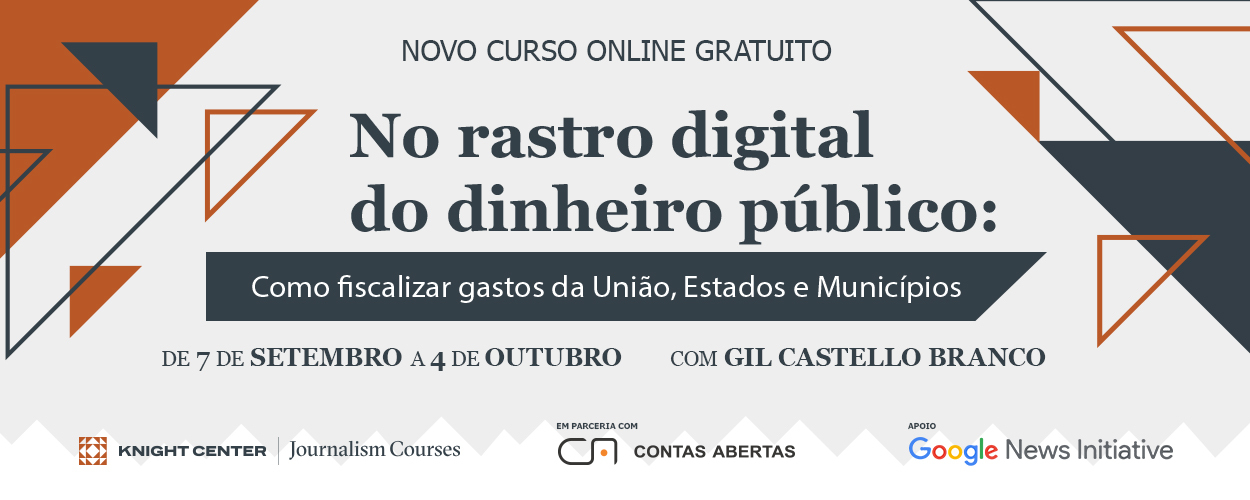The Brazilian government authorized this year spending of more than $513 billion Real (almost $100 billion dollars) for the COVID-19 pandemic. When he realized the volume of these expenses that were planned only by the federal administration, Gil Castello Branco remembered the corruption involved with another of the Brazilian government’s mega program, the 2014 World Cup.
“The spending on the pandemic is equivalent to more than 20 World Cups. We saw several irregularities in the spending on the World Cup, so what are we to expect from the spending to face COVID-19? We need to do something to expand the capacity of the press and citizens in general to inspect these expenses,” Castelo Branco said.
Founder of the NGO Contas Abertas, which is specialized in providing transparency about the public spending in Brazil, Castelo Branco will be the instructor of the Knight Center's next massive open online course (MOOC) for Brazilian journalists and non-journalists:“No rastro digital do dinheiro público: Como fiscalizar gastos da União, estados e municípios“ (On the digital trace of public money: How to inspect federal, state and municipal expenditures).
In four weeks, participants of this free course will learn how public budgeting works and how to identify potential cases of taxpayer money misuse. The course takes place from Sept. 7 to Oct. 4 and is done in partnership with Contas Abertas and with the support of the Google News Initiative.
Click here to register for free on the Knight Center’s distance learning platform.
“The language surrounding the budget is dry and some words and expressions can be scary at first glance for those who are not used to dealing with public spending,” pointed out Gil Castello Branco, who is the MOOC's main instructor. “Throughout the course, the journalist will master some essential concepts and see that the budget is not a bogeyman. One of the objectives of the course is to translate economic jargon into simple language. "

Gil Castello Branco
Castello Branco is a veteran in training journalists to monitor the use of public money. He has given courses and lectures at mainstream Brazilian media outlets, he was a visiting professor at UNICAMP and a monthly columnist for the newspapers Correio Braziliense, O Estado de S. Paulo and O Globo. In this MOOC, he will have the support of Carlos Brener, deputy secretary general of the Associação Contas Aberta, and Natália Mazotte, a journalist who is specialized in data and technology and who has collaborated with the Knight Center for several years.
“This course fits perfectly with the two decades of Knight Center´s efforts to help journalists use digital technology to improve their investigative work. We have already trained thousands of reporters and editors from around the world in data journalism and now we have a more specific opportunity to help Brazilian colleagues to oversee public spending in their country,” said professor Rosental Calmon Alves, founder and director of the Knight Center .

"We are very grateful to Gil Castello Branco and Carlos Brener, from the Associação Contas Abertas, for their partnership in this project, and to the Google News Initiative, which has helped us offer free online courses for journalists," Alves said.
The course “No rastro digital do dinheiro público: Como fiscalizar gastos da União, estados e municípios” is open to everyone and it will be specially relevant for journalists in Brazil.
“In general, journalists like text and context more than numbers. However, it seems that all public policies are in the budget. Regardless of the journalist's beat (health, education, safety, culture, environment, sport, etc.), knowing the numbers related to government programs and actions generates better stories,” said Castello Branco.
The course will consists of four weekly modules. The first module will present the necessary concepts to regarding the public budget. In the second module, students will see how to monitor union spending, and will include practical exercises on how to navigate through some of the main portals that provide budget data. The third module will give information on how to monitor state revenues, expenditures and indicators. Finally, in the fourth module, instructors will show participants how to track municipal spending.
The course is asynchronous, which means that there will not be any mandatory activities scheduled to be due at specific times. Participants can enter the course and complete the activities at their own pace, when it is most convenient for them.
Like all of Knight Center’s MOOCs, registration is free, but participants who want to get a certificate of completion must meet the requirements, apply for the certificate and pay an administrative fee of $30. The certificate will be issued only to students who actively participate in the course and complete the proposed tests and exercises. The document can be downloaded in PDF format after the Knight Center verifies that the course requirements have been met. No type of formal academic credit is associated with the certificate.